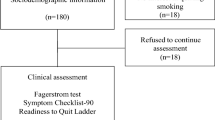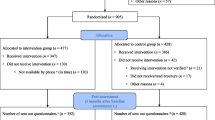Abstract
Purpose
We examined the association between daily smokers’ mental health according to the five-item Mental Health Inventory and the core constructs of the transtheoretical model (TTM): stage of change, processes of change, smoking cessation self-efficacy, and decisional balance.
Method
Questionnaire data from 1,334 daily smoking primary care patients were used for multinomial logistic, linear, and ordinal logistic regression analyses controlling for effects of sociodemographic characteristics.
Results
Smokers with lower levels of mental health had increased odds to contemplate quitting within the next 6 months compared to not intending to quit at all. In addition, they reported an elevated use of change processes as well as an enhanced endorsement of positive and negative aspects of nonsmoking. However, in a subsample analysis performed on smokers in contemplation stage, low mental health was related to lower self-efficacy expectancies in negative affect situations.
Conclusion
Mental health does not appear to constitute a precondition for readiness to change smoking behavior in daily smokers. Nonetheless, smokers with low mental health might require support to deal with negative affect situations.
Similar content being viewed by others
References
Breslau N, Kilbey M, Andreski P. Nicotine dependence, major depression, and anxiety in young adults. Arch Gen Psychiatry. 1991;48(12):1069–74.
Glassman AH, Helzer JE, Covey LS, Cottler LB, Stetner F, Tipp JE, et al. Smoking, smoking cessation, and major depression. J Am Med Assoc. 1990;264(12):1546–9.
John U, Meyer C, Rumpf H-J, Hapke U. Smoking, nicotine dependence and psychiatric comorbidity—a population-based study including smoking cessation after three years. Drug and Alcohol Depend. 2004b;76(3):287–95.
Breslau N, Novak SP, Kessler RC. Daily smoking and the subsequent onset of psychiatric disorders. Psychol Med. 2004a;34(2):323–33.
Degenhardt L, Hall W. The relationship between tobacco use, substance-use disorders and mental health: results from the National Survey of Mental Health and Well-Being. Nicotine Tob Res. 2001;3(3):225–34.
Anda RF, Williamson DF, Escobedo LG, Mast EE, Giovino GA, Remington PL. Depression and the dynamics of smoking. A national perspective. J Am Med Assoc. 1990;264(12):1541–5.
Lasser K, Boyd JW, Woolhandler S, Himmelstein DU, McCormick D, Bor DH. Smoking and mental illness: a population-based prevalence study. J Am Med Assoc. 2000;284(20):2606–10.
Ferguson JA, Patten CA, Schroeder DR, Offord KP, Eberman KM, Hurt RD. Predictors of 6-month tobacco abstinence among 1224 cigarette smokers treated for nicotine dependence. Addict Behav. 2003;28(7):1203–18.
Kinnunen T, Doherty K, Militello FS, Garvey AJ. Depression and smoking cessation: characteristics of depressed smokers and effects of nicotine replacement. J Consul Clin Psychol 1996;64(4):791–8.
Breslau N, Novak SP, Kessler RC. Psychiatric disorders and stages of smoking. Biol Psychiatry. 2004b;55(1):69–76.
El-Guebaly N, Cathcart J, Currie S, Brown D, Gloster S. Smoking cessation approaches for persons with mental illness or addictive disorders. Psychiatr Serv. 2002;53(9):1166–70.
Hitsman B, Borrelli B, McChargue DE, Spring B, Niaura R. History of depression and smoking cessation outcome: a meta-analysis. J Consult Clin Psychol. 2003;71(4):657–63.
John U, Meyer C, Rumpf H-J, Hapke U. Depressive disorders are related to nicotine dependence in the population but do not necessarily hamper smoking cessation. J Clin Psychiatry. 2004a;65(2):169–76.
Johnson EO, Breslau N. Is the association of smoking and depression a recent phenomenon? Nicotine Tob Res. 2006;8(2):257–62.
Prochaska JO, Velicer WF. The transtheoretical model of health behavior change. Am J Health Promot. 1997;12(1):38–48.
Prochaska JO, Velicer WF, DiClemente CC, Fava J. Measuring processes of change: applications to the cessation of smoking. J Consult Clin Psychol. 1988;56(4):520–8.
Bandura A. Self-efficacy: toward a unifying theory of behavioral change. Psychol Rev. 1977;84(2):191–215.
Janis IL, Mann L. Decision making: a psychological analysis of conflict, choice and commitment. New York, NY: Free; 1977.
Farkas AJ, Pierce JP, Gilpin EA, Zhu SH. Is stage-of-change a useful measure of the likelihood of smoking cessation? Annals Behav Med. 1996;18(2):79–86.
Herzog TA. Are the stages of change for smokers qualitatively distinct? An analysis using an adolescent sample. Psychol Addict Behav. 2007;21(1):120–5.
Herzog TA, Blagg CO. Are most precontemplators contemplating smoking cessation? Assessing the validity of the stages of change. Health Psychol. 2007;26(2):222–31.
Hughes JR, Keely JP, Fagerstrom KO, Callas PW. Intentions to quit smoking change over short periods of time. Addict Behav. 2005;30(4):653–62.
Sutton S. Back to the drawing board? A review of applications of the transtheoretical model to substance use. Addiction 2001;96(1):175–86.
Weinstein ND, Rothman AJ, Sutton SR. Stage theories of health behavior: conceptual and methodological issues. Health Psychol. 1998;17(3):290–9.
Noar SM, Benac CN, Harris MS. Does tailoring matter? Meta-analytic review of tailored print health behavior change interventions. Psychol Bull. 2007;133(4):673–93.
Spencer L, Pagell F, Hallion ME, Adams TB. Applying the transtheoretical model to tobacco cessation and prevention: a review of literature. Am J Health Promot. 2002;17(1):7–71.
Acton GS, Prochaska JO, Kaplan AS, Small T, Hall SM. Depression and stages of change for smoking in psychiatric outpatients. Addict Behav. 2001;26(5):621–31.
Finnell DS. Use of the transtheoretical model for individuals with co-occurring disorders. Community Ment Health J. 2003;39(1):3–15.
Prochaska JO, Rossi JS, Redding CA, Rosen AB, Tsoh JY, Humfleet GL, et al. Depressed smokers and stage of change: implications for treatment interventions. Drug Alcohol Depend. 2004;76(2):143–51.
Rogers ES, Martin R, Anthony W, Massaro J, Danley K, Crean T, et al. Assessing readiness for change among persons with severe mental illness. Community Ment Health J. 2001;37(2):97–112.
Lerman C, Audrain J, Orleans CT, Boyd R, Gold K, Main D, et al. Investigation of mechanisms linking depressed mood to nicotine dependence. Addict Behav. 1996;21(1):9–19.
Cargill BR, Emmons KM, Kahler CW, Brown RA. Relationship among alcohol use, depression, smoking behavior, and motivation to quit smoking with hospitalized smokers. Psychol Addict Behav. 2001;15(3):272–5.
Tsoh JY, Hall SM. Depression and smoking: from the transtheoretical model of change perspective. Addict Behav. 2004;29(4):801–5.
Veit CT, Ware JE Jr. The structure of psychological distress and well-being in general populations. J Consult Clin Psychol. 1983;51(5):730–42.
Ansseau M, Dierick M, Buntinkx F, Cnockaert P, De Smedt J, Van Den Haute M, et al. High prevalence of mental disorders in primary care. J Affect Disord. 2004;78(1):49–55.
Hoch E, Muehlig S, Hofler M, Lieb R, Wittchen HU. How prevalent is smoking and nicotine dependence in primary care in Germany? Addiction 2004;99(12):1586–98.
Rumpf H-J, Meyer C, Hapke U, John U. Screening for mental health: validity of the MHI-5 using DSM-IV Axis I psychiatric disorders as gold standard. Psychiatry Res. 2001;105(3):243–53.
Stewart AL, Hays RD, Ware JE Jr. The MOS short-form general health survey. Reliability and validity in a patient population. Med Care. 1988;26(7):724–35.
Ware JE Jr, Snow K, Kosinski M, Gandek B. SF-36 Health Survey: manual and interpretation guide. Bosten, MA: Health Institute; 1993.
Etter JF, Bergman MM, Perneger TV. On quitting smoking: development of two scales measuring the use of self-change strategies in current and former smokers (SCS-CS and SCS-FS). Addict Behav. 2000;25(4):523–38.
Jäkle C, Keller S, Baum E, Basler H-D. Scales for the measurement of self-efficacy and decisional balance in the process of behavioral change in smokers [German]. Diagnostica 1999;45(3):138–46.
Tönjes B, Meyer C, Ulbricht S, Schumann A, Rüge J, Rumpf H-J, et al. Skalen zur Erfassung der Kernkonstrukte des Transtheoretischen Modells zur Änderung des Rauchverhaltens: Psychometrische Eigenschaften in einer repräsentativen Stichprobe hausärztlicher Patienten [Scales to assess core-constructs of the transtheoretical model regarding smoking behavior change: psychometric properties in a representative sample of general practice patients]. Z Gesundh. 2007;15(2):67–77.
Heatherton TF, Kozlowski LT, Frecker RC, Fagerström KO. The Fagerström Test for Nicotine Dependence: a revision of the Fagerström Tolerance Questionnaire. Br J Addict. 1991;86(9):1119–27.
Hausman J, McFadden D. Specification tests for the multinomial logit model. Econometrica 1984;52(5):1219–40.
Small KA, Hsiao C. Multinomial logit specification tests. Int Econ Rev. 1985;26(3):619–27.
Brant R. Assessing proportionality in the proportional odds model for ordinal logistic regression. Biometrics 1990;46(4):1171–8.
Greenland S. Modeling and variable selection in epidemiologic analysis. Am J Public Health. 1989;79(3):340–9.
Jarvis MJ. Patterns and predictors of smoking cessation in the general population. In: Bollinger CT, Fagerström KO, editors. The tobacco epidemic, vol. 28. Basel, Switzerland: Karger; 1997. p. 151–64.
John U, Meyer C, Rumpf H-J, Hapke U. Relation among stage of change, demographic characteristics, smoking history, and nicotine dependence in an adult German population. Prev Med. 2003;37(4):368–74.
Wewers ME, Stillman FA, Hartman AM, Shopland DR. Distribution of daily smokers by stage of change: current population survey results. Prev Med. 2003;36(6):710–20.
Breslau N. Psychiatric comorbidity of smoking and nicotine dependence. Behav Genet. 1995;25(2):1995.
Fergusson DM, Goodwin RD, Horwood LJ. Major depression and cigarette smoking: results of a 21-year longitudinal study. Psychol Med. 2003;33(8):1357–67.
Grant BF, Hasin DS, Chou SP, Stinson FS, Dawson DA. Nicotine dependence and psychiatric disorders in the United States: results from the national epidemiologic survey on alcohol and related conditions. Arch Gen Psychiatry. 2004;61(11):1107–15.
Silagy C, Lancaster T, Stead L, Mant D, Fowler G. Nicotine replacement therapy for smoking cessation. Cochrane Database Syst Rev. 2004;(3):CD000146.
LaVange LM, Koch GG, Schwartz TA. Applying sample survey methods to clinical trials data. Stat Med. 2001;20(17–18):2609–23.
Haukkala A, Uutela A, Vartiainen E, McAlister A, Knekt P. Depression and smoking cessation: the role of motivation and self- efficacy. Addict Behav. 2000;25(2):311–6.
Nolen-Hoeksema S. Responses to depression and their effects on the duration of depressive episodes. J Abnorm Psychol. 1991;100(4):569–82.
Etter JF, Perneger TV, Ronchi A. Distributions of smokers by stage: international comparison and association with smoking prevalence. Prev Med. 1997;26(4):580–5.
Velicer WF, Fava JL, Prochaska JO, Abrams DB, Emmons KM, Pierce JP. Distribution of smokers by stage in three representative samples. Prev Med. 1995;24(4):401–11.
Acknowledgments
The “Proactive interventions for smoking cessation in General medical Practices” (Pro GP) project is part of the German research network EARLINT (early substance use intervention) and is funded by the German Federal Ministry of Research and Education (grant no. 01EB0120, 01EB0420), the Social Ministry of the State of Mecklenburg-Vorpommern (grant no. IX311a 406.68.43.05), and the German Research Foundation (Deutsche Forschungsgemeinschaft, grant no. JO150/6-1). We would like to thank all patients, general practitioners and their assistants who participated at our study. We also appreciate for the contributions to data collection made by study nurses, interviewers, and computer specialists.
Author information
Authors and Affiliations
Corresponding author
Rights and permissions
About this article
Cite this article
Schorr, G., Ulbricht, S., Baumeister, S.E. et al. Mental Health and Readiness to Change Smoking Behavior in Daily Smoking Primary Care Patients. Int.J. Behav. Med. 16, 347–354 (2009). https://doi.org/10.1007/s12529-008-9012-6
Accepted:
Published:
Issue Date:
DOI: https://doi.org/10.1007/s12529-008-9012-6




